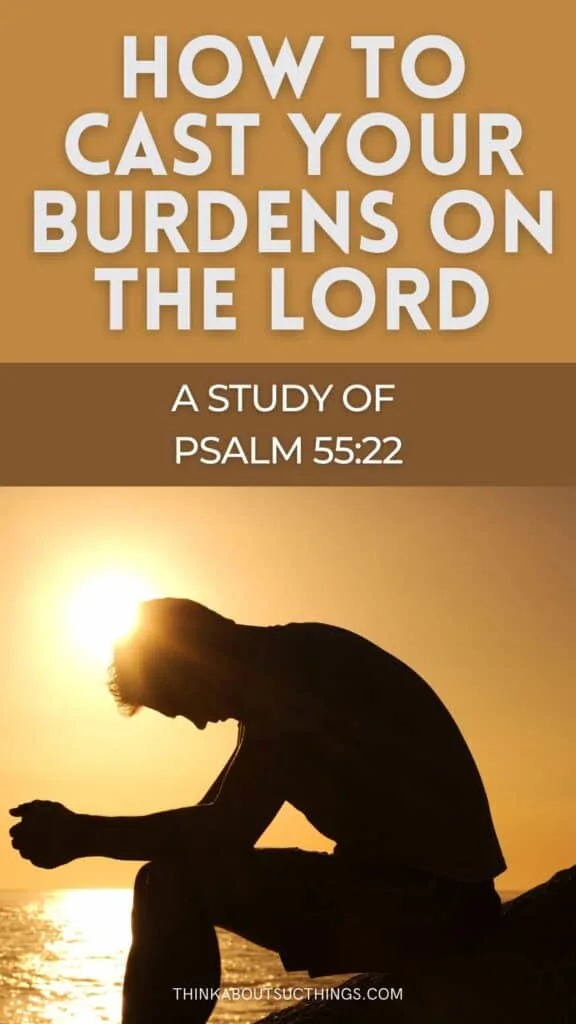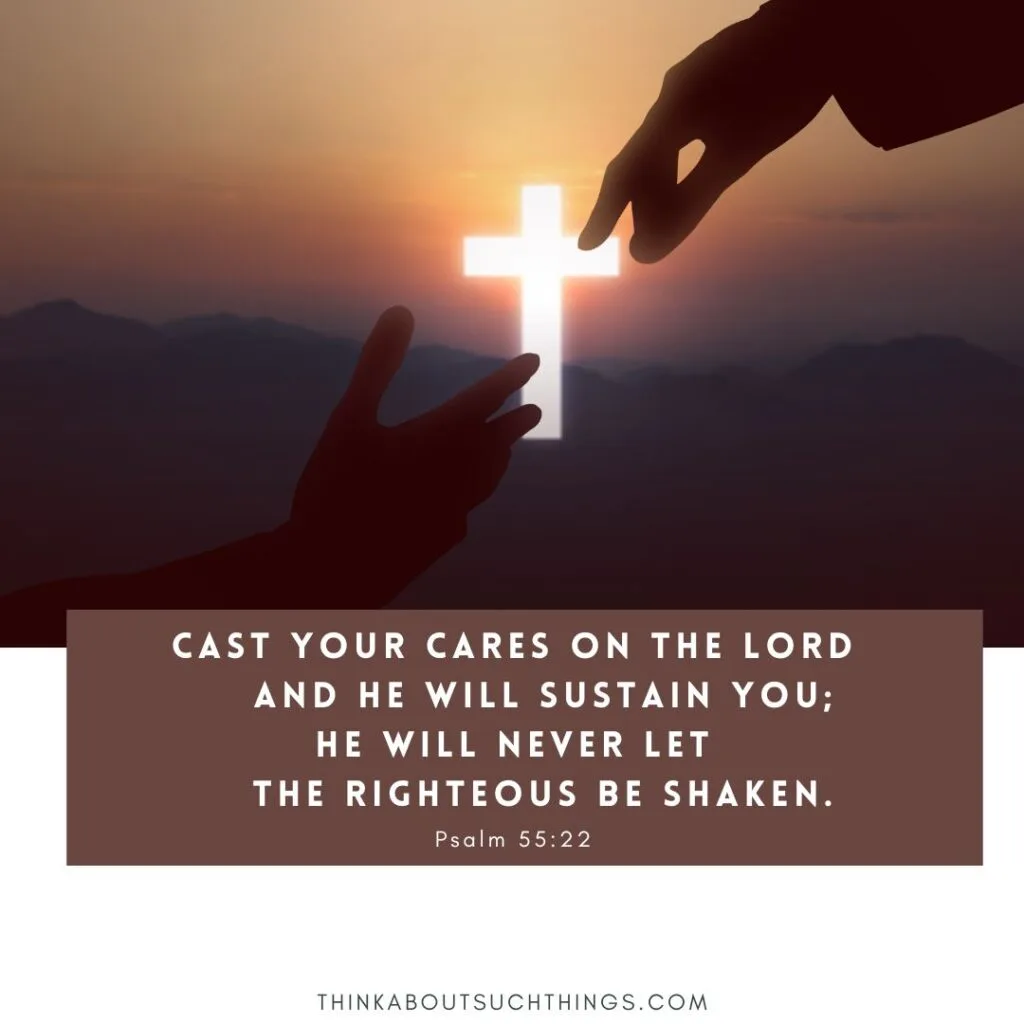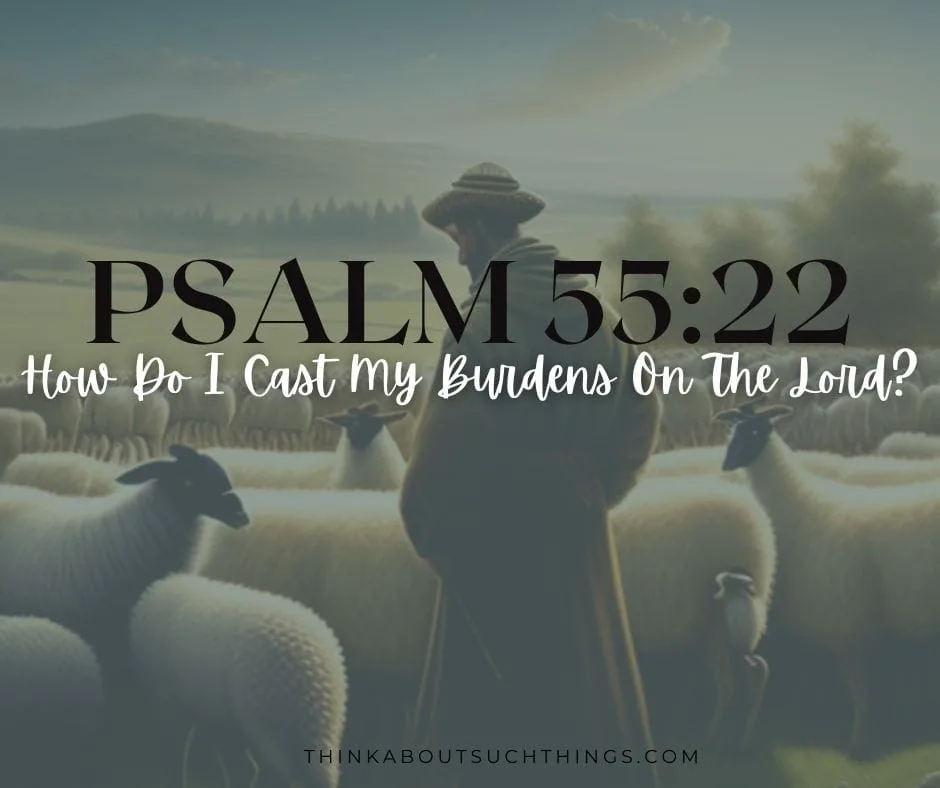In this article, We will look at the meaning of Psalm 55:22 and learn how we can cast our burdens on the Lord. So, grab your Bible, and let’s learn…
The Book of Psalms is arguably one of the best books for imparting wisdom after Proverbs (or maybe even on the same level).
Throughout the 150 Psalms, we can see worship, praise, guidance, and calls to repentance.
However, as full of wisdom as they are, not all of these nuggets are necessarily easy to understand, either because they were stated in ways that modern readers don’t understand.
Or because it refers to our spiritual beings in such a way that we can’t grasp it with our minds because we are looking at it through a lens of the natural world.
One example of the latter is Psalm 55:22.
What does this verse mean, and what can we, as modern believers, learn from it? We will cover those questions and more!

Check Out More: Cast All Your Cares: The Meaning Of 1 Peter 5:7 and 6 Helpful Ways You Can Cast Your Cares on the Lord
The Context Of Psalm 55:22
Context is important.
Imagine you’re reading a line from your favorite song. You bob your head to the tune, you feel the rhythm, but do you really know what it means?
It’s like that with Bible verses, too. You can’t just pluck one out and assume you’ve got the whole picture.
Think of it as a puzzle piece. Alone, it’s just a splash of color. But when you slot it into the rest of the jigsaw, it forms part of an amazing scene. That’s how Bible verses work. They’re not standalone statements; they’re parts of chapters, books, and amazing narratives.
And don’t forget the speaker! Who’s talking, who are they talking to, what’s happening around them – all of these things paint the full picture. So, let’s analyze the context of Psalm 55:22.
Psalm 55 Is A Maskil (“Maschil”)
The first verse of Psalm 55 says it is a “Maskil of David.” But what does that mean?
The word “Maskil” (often spelled as “Maschil”) is a didactic song. In other words, it’s a song that enforces or teach some lesson of wisdom or holiness.
מַשְׂכִּיל maskîyl, mas-keel’; from H7919; instructive, i.e. a didactic poem:—Maschil.
In other words, David wrote this Psalm to convey some wisdom about how we should live righteous and holy in the sight of God.
The Background Of Psalm 55
Since it is a Maskil, we should not try to read too much backstory into this Psalm, though humans tend to learn wisdom through our experiences.
According to scholars, the background is likely Absalom’s rebellion and Ahithophel’s betrayal (2 Samuel 15-17).
This was a time when David’s life and rule were threatened, and even his most trusted advisor betrayed him.
Looking at the entire Psalm, this background makes complete sense, especially when we look at verses 12 to 14:
“For it is not an enemy who taunts me – then I could bear it; it is not an adversary who deals insolently with me – then I could hide from him. But it is you, a man, my equal, my companion, my familiar friend. We used to take sweet counsel together; within God’s house we walked in the throng.”
The Two Parts Of Psalm 55
Psalm 55 has two distinct sections.
- The first part, verses 1 to 15, deals with David’s anguish over betrayal and rebellion.
He desires to flee and hide in the wilderness because of all the wrongs he’s witnessed. He also calls out to God to deliver him and to bring destruction to his enemies. - The second part starts in verse 16, where David says, “But I call to God, and the LORD will save me.” He then speaks of how God will save him from his situation.
As with any type of lesson, the first part sets the context, while the last part gives the conclusion and the wisdom that we should learn from it.
So, it’s no coincidence that it’s in this second part that we find verse 22:
“Cast your burden on the LORD, and He will sustain you; He will never permit the righteous to be moved.”
The Meaning Of Psalm 55:22
Let’s look at what exactly David meant in Hebrew when he wrote this verse by breaking down key words. Here is the verse, and I have bolded the key words we will examine.
“Cast your burden on the LORD, and He will sustain you; He will never permit the righteous to be moved.”

Cast
The word translated as “cast” is the Hebrew word “shalak” (Strong’s number H7993).
7993. שָׁלַךְshalak, shaw-lak; a primitive root; to throw out, down or away (literally or figuratively):—adventure, cast (away, down, forth, off, out), hurl, pluck, throw.
It doesn’t refer to placing a burden on God as someone would place a burden on an animal, though that’s how we usually understand it.
The word literally means “to throw out or hurl.”
The context is similar to “casting something away from you, getting rid of it,” as you would throw away an insect you find crawling on you.
It’s not a gentle move!
Burden
So, what should we throw away to the LORD? The Hebrew word for “burden” is “yehab” (Strong’s number H3053).
3053. יְהָבyhab, ye-hawb´; from 3051; properly, what is given (by Providence), i.e. a lot:—burden.
3051. יָהַבyahab, yaw-hab´; a primitive root; to give (whether literal or figurative); generally, to put; imperatively (reflexive) come:—ascribe, bring, come on, give, go, set, take.
It refers to something given to you by providence, your “lot,” or a burden—something you carry because of circumstances and that you can’t get rid of.
Sustain
This is the Hebrew word “kul” (Strong’s number H3557) which means to keep in, maintain, guide, and provide for. It can also mean to feed, which I find amazing.
3557. כּוּלkuwl, kool; a primitive root; properly, to keep in; hence, to measure; figuratively, to maintain (in various senses):—(be able to, can) abide, bear, comprehend, contain, feed, forbearing, guide, hold(-ing in), nourish(-er), be present, make provision, receive, sustain, provide sustenance (victuals).
Never
This is an interesting one. It consists of two Hebrew words:
- “Lo Lo Loh” (Strong’s number H3808). It means “not” or “no.”
- “Olam Olam” (Strong’s number H5769). This refers to eternity, past and future, all time, perpetually.
So, “never” means “not ever in all of eternity.”
3808. לֹאloʾ, lo; or לוֹאlowi, lo; or לֹהloh(Deut. 3:11), lo; a primitive particle; not (the simple or abs. negation); by implication, no; often used with other particles (as follows):—x before, + or else, ere, + except, ig(-norant), much, less, nay, neither, never, no((-ne), -r, (-thing)), (x as though…,(can-), for) not (out of), of nought, otherwise, out of, + surely, + as truly as, + of a truth, + verily, for want, + whether, without.
5769. עוֹלָםꜥowlam, o-lawm´; or עֹלָםꜥolam, o-lawm´; from 5956; properly, concealed, i.e. the vanishing point; generally, time out of mind (past or future), i.e. (practically) eternity; frequentatively, adverbial (especially with prepositional prefix) always:—alway(-s), ancient (time), any more, continuance, eternal, (for, (n-))ever(-lasting, -more, of old), lasting, long (time), (of) old (time), perpetual, at any time, (beginning of the) world (+ without end). Compare 5331, 5703.
Be Moved
The Hebrew word “mot” (Strong’s H4131) means to waver, slip, shake, or fall.
4131. מוֹטmowt, mote; a primitive root; to waver; by implication , to slip, shake, fall:—be carried, cast, be out of course, be fallen in decay, x exceedingly, fall(-ing down), be (re-)moved, be ready, shake, slide, slip.
Putting Psalm 55:22 Together
So, when we take all of these extended translation options, Psalm 55:22 says something closer to the following:
Throw away those things you carry due to your circumstances; throw them on God, then He will maintain you, guide you, feed you, and provide for you because He will never in all eternity let righteous people waver, slip, shake, or fall.
Isn’t the Hebrew rich?!
How Do I Cast My Burdens On The Lord?

This is the catch, isn’t it?
It sounds inspiring to say the verse out loud, but when it comes to doing it, that’s when we get caught up in the “hows” and the “buts.”
However, nothing in the Bible is ever as complicated as we make it, and casting your burdens on God is really not complex unless we make it so.
- Say it out loud.
Pray to God, but out loud (yell it if you have to; remember to throw, not gently push away). Tell Him what your burdens are. Throw all of them away to Him. - Don’t pick it up again.
Remember that once you throw something away, you do not return to it. You don’t pick a cockroach off your arm and throw it away, then return to pick it up again.
It’s like a child who gives their broken toy to their dad to fix. The dad is fixing it, but the child tries to interfere every few minutes instead of just letting him fix it.
This part requires faith, but that’s not so difficult either.
- Stir your faith.
Do this by thanking God and investing time in His Word. Most children (at least those in stable households) don’t have to be concerned about what they will eat. They don’t have to beg their parents for food.
They just know that their parents are working on it and will take care of it. That’s the kind of faith we must have.
God portrays Himself as a loving, caring father. Faith is not complicated. It involves getting to know the character of God and believing that He is Who He says He is, and the best way to do that is to spend time in His Word, studying Him, and learning Who He is.
- Get warriors around you.
Ask another believer (or group of believers) to pray for you and to help you keep your faith up.
A significant part of David’s success was because of the warriors he surrounded himself with. We must do the same since they will fill us with courage and help stir our faith. - Don’t listen to the enemy.
Yes, your current physical circumstances may not reflect what you believe, but God’s Word is above your circumstances, and He is already working out the solution. Rebuke the negative thoughts and replace them with the Word of God.
But I’m Not Righteous?
This is a significant stumbling block for many people.
The verse specifically says that God will not let the righteous be moved, so when we try to make this scripture our own, we are confronted with our weaknesses and faults; the enemy is always eager to remind us that we are not righteous.
However, the Bible says the following:
“For our sake He made Him to be sin who knew no sin, so that in Him we might become the righteousness of God.” – 2 Corinthians 5:2
We are not righteous by a long shot, and anyone who says they are righteous is deceiving themselves. However, when we are in Christ, we are righteous, not because of who we are, but because of Who He is. We become children of God.
If you are in Christ, you are already righteous regardless of your mistakes, and all of God’s promises apply to you.
In Psalm 55:22, David encourages us to throw anything weighing us down onto God. He promises to care for us and never let the righteous stumble.
This requires faith and endurance, but God never places an expectation on us that we cannot meet through Christ and the Holy Spirit.
So, be encouraged…meet with the Lord and cast your burdens upon Him!

Melissa is a passionate minister, speaker and an ongoing learner of the Bible. She has been involved in church and vocational ministry for over 18 years. And is the founder of Think About Such Things. She has the heart to equip the saints by helping them get into the Word of God and fall more in love with Jesus. She also enjoys family, cooking, and reading.
She has spoken in churches in California, Oregon, Texas, and Mexico and has been featured in Guidepost Magazine and All Recipes Magazine. Read More…
